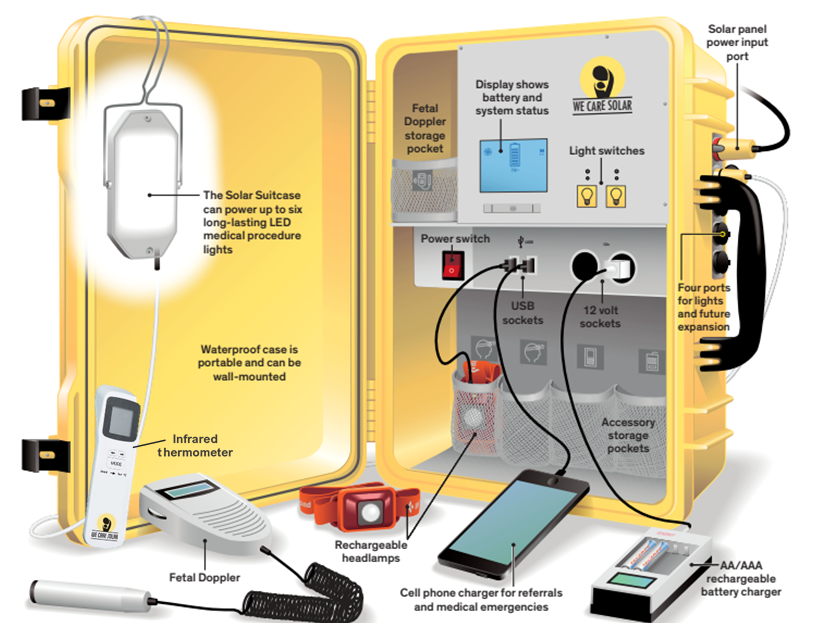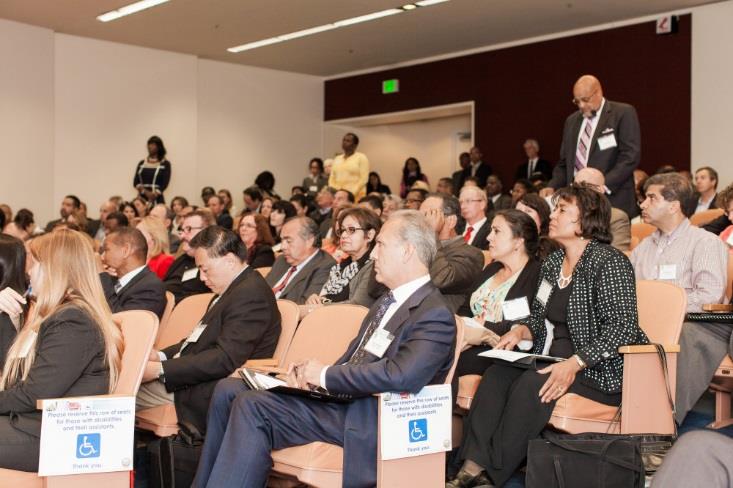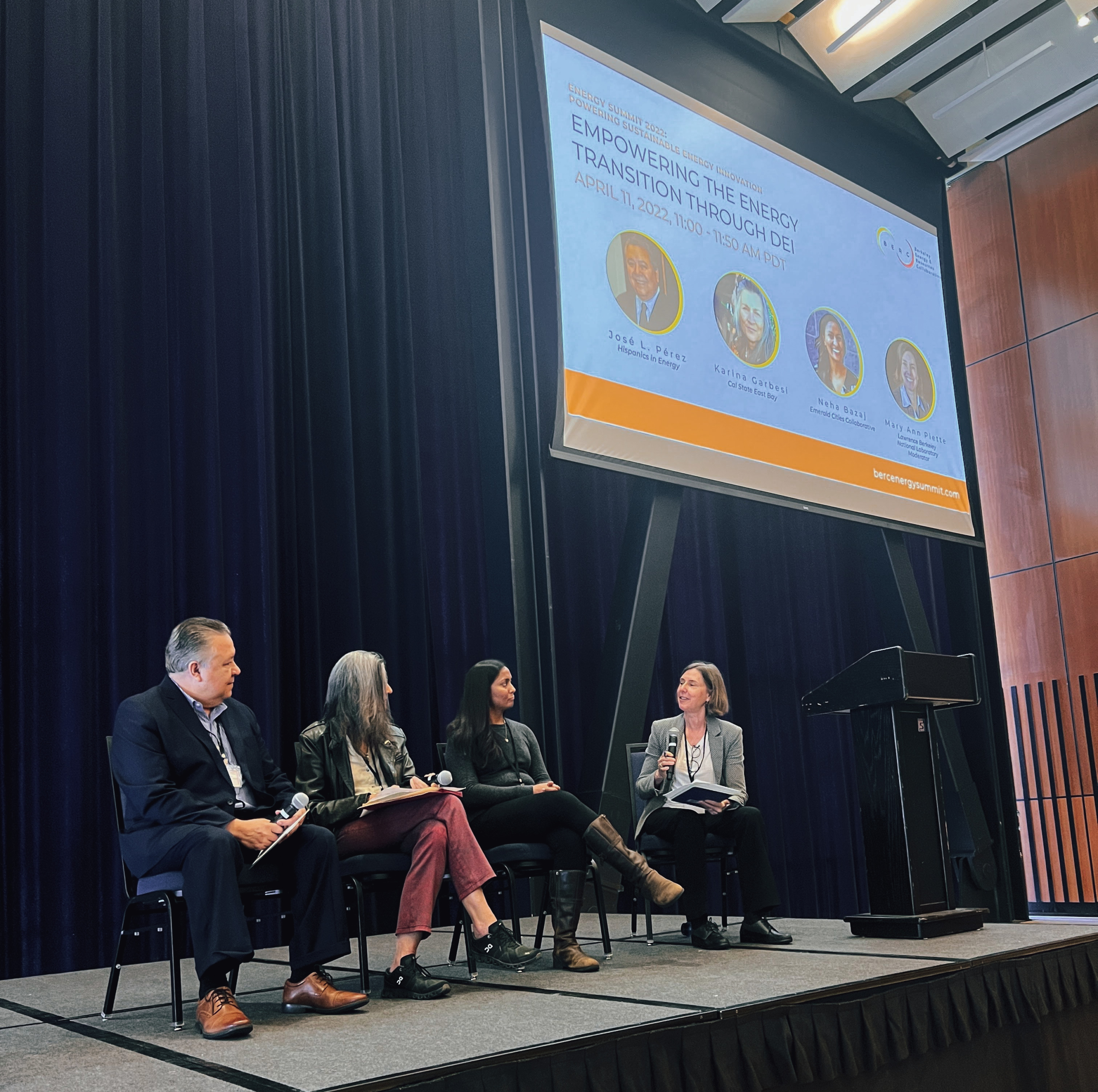The Berkeley Energy & Resources Collaborative (BERC) held its annual Energy Summit on April 11 and 13, 2022. The theme of this year’s event was “Powering Sustainable Energy Innovation” and included panel discussions and a graduate career forum.
As the energy transition is projected to create large numbers of new employment opportunities, it is important that diversity, equity, and inclusion (DEI) are improved within the clean energy sector. An important panel, titled “Empowering the Energy Transition Through Diversity, Equity, and Inclusion (DEI),” explored opportunities for leveraging the power of diverse perspectives leading to a more sustainable energy future.
The panel was moderated by Mary Ann Piette, Director of Building Technology and Urban Systems (BTUS) Division in the Energy Technologies Area at the Lawrence Berkeley National Laboratory. Following her opening remarks, Piette introduced the panelists: Neha Baraj, Senior Economic Inclusion Manager, Bay Area at Emerald Cities Collaborative (ECC); Jose L. Perez, President and CEO of Hispanics in Energy (HIE); and Dr. Karina Garbesi, Director of Environmental Studies, Cal State East Bay and co-founder, We Care Solar (WCS).
Righting Wrongs: Climate Injustice and Racial Inequality
Garbesi stated: “Saving the world will require all of us working together in the same direction.” As a positive approach, the work of We Care Solar includes a Solar Suitcase that allows children to build solar-based electric systems that can be used in environments, such as schools and medical facilities, that lack electricity. This is an important project designed to build capacity in lower-income communities that lack reliable access to energy.

Perez emphasized the need to engage all underrepresented populations and noted that Hispanics in Energy aims to include Hispanics in the energy industry. To that end, the non-profit works to increase diverse representation in Investor-Owned Utilities (IOUs) like Pacific Gas & Electric (PG&E). A positive development is the recent California Public Utilities Commission (CPUC) General Order 156requires utilities to procure a certain percentage of their contracts with majority women-, minority-, disabled veteran-, and/or LGBT-owned businesses. Perez also added that “language justice”—providing information and opportunities to participate in multiple languages—is key.

Lack of equity was highlighted as a critical issue. Baraj emphasized that the climate crisis is a matter of racial justice. She added that it is important to move the narrative from addressing “how do we not do harm?” to “how do we improve residents’ lives?” The Emerald Cities Collaborative is involved in a number of initiatives, ranging from helping low- and moderate-income communities implement clean energy programs to Baraj added that it is not just a lack of information on environmental or energy issues—”if you are not backing up that information with financial resources,” she said, “we are not going to get change.”
People Power: Leveraging Collective Climate Action
Piette then asked how we can build upon climate change work being done, and whether the landscape has changed during the last five years. The COVID-19 pandemic, for example, has shed light on those who can or cannot work from home. Recent movements like Black Lives Matter (BLM) have highlighted the need to bring justice to communities of color.
“It is perhaps easy to feel frustrated with how slowly change happens,” said Garbesi. “There’s a place for anger, for fear, but we need to learn how to direct it for good. Greta Thunberg got it right—permitting fossil fuels is immoral. One of the most important things we can do is empower children to speak out.”
The panel concluded on a hopeful note, suggesting we can make a positive change. To this end, the panelists emphasized the importance of widespread engagement, increased representation of minority and marginalized groups, and multilingual communication.
The Berkeley Energy and Resources Coalition (BERC) aims to promote action-driven conversations around critical energy and resource issues. CIEE is proud to work with BERC towards equitable solutions to the world’s most pressing environmental challenges.
About the Berkeley Energy & Resources Collaborative (BERC)
Advancing Sustainability with the Emerald Cities Collaborative
The Power to Save Lives – We Care Solar
Read the CPUC General Order 156
Feature image credit: Charmian Molina/BERC


